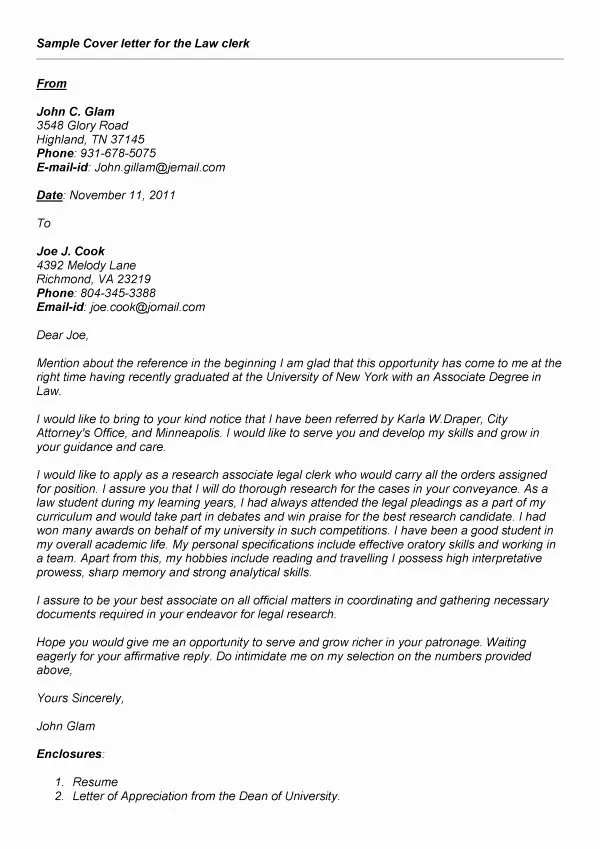Understanding the Judicial Clerkship Cover Letter
A judicial clerkship cover letter is your initial introduction to a judge, and it’s your chance to make a strong first impression. Unlike a generic job application letter, a judicial clerkship cover letter requires careful tailoring and attention to detail. It’s more than just a formality; it’s a crucial tool that demonstrates your understanding of the judicial process, your legal writing abilities, and your genuine interest in the specific judge and court. A well-crafted cover letter can significantly increase your chances of securing an interview and ultimately landing the clerkship. It should showcase not only your academic achievements and legal skills but also your personality and why you are a good fit for the judge’s chambers. It should also be a clear demonstration of your research and knowledge of the judicial system.
Researching the Judge and Court
Before you start writing your cover letter, thorough research is paramount. You need to know everything you can about the judge to whom you are applying. Begin by reviewing the judge’s biography on the court’s website. Pay attention to their educational background, prior experience, and any notable cases they have presided over. Look for any published opinions or scholarly articles they may have written. This research will help you tailor your letter to demonstrate your understanding of the judge’s work and interests. Also, research the court itself. What type of cases does it handle? What is the court’s culture like? Understanding the court’s specific environment and the judge’s role within it will help you write a more compelling and targeted cover letter.
Highlighting Relevant Experience

Judges seek clerks with relevant experience that demonstrates their potential to excel in the role. Focus on experiences that showcase your legal skills, such as legal research, writing, and analysis. If you’ve worked on a law review, moot court, or any other activities where you’ve honed these skills, be sure to highlight them. Include internships or previous jobs, especially those in the legal field, such as working at a law firm, government agency, or another court. Briefly describe your responsibilities and the skills you developed in these roles. Quantify your achievements whenever possible. For example, rather than simply stating you did legal research, say you “researched and drafted memoranda on over 20 cases.” This adds credibility and makes your application stand out from the crowd. Make sure the experience is clearly and concisely presented.
Tailoring Your Cover Letter
A generic cover letter won’t cut it. Judges can easily spot a form letter, and it will likely end up in the rejection pile. You must tailor your cover letter to each judge and court. Start by addressing the judge by name, and make sure to spell it correctly. Reference specific cases, opinions, or areas of legal expertise that the judge is known for. Explain why you are specifically interested in clerking for that particular judge. What aspects of their work resonate with you? Why do you believe you’d be a good fit for their chambers? Demonstrate that you’ve invested time and effort into understanding their work. Mentioning their recent publications or referencing their judicial philosophy shows genuine interest and that you are not just sending out a mass email. Your cover letter should be a personalized reflection of your interest.
Showcasing Your Legal Writing Skills
Judicial clerks must possess exceptional legal writing skills. Judges need clerks who can write clear, concise, and persuasive legal memoranda, opinions, and other documents. Your cover letter is an opportunity to demonstrate those skills. Pay close attention to grammar, punctuation, and style. Ensure your letter is free of errors. Use clear and direct language. Avoid overly complex sentence structures and jargon. Show, don’t tell. Instead of saying you’re a good writer, demonstrate it through your writing. Choose your words carefully and structure your sentences effectively. Also, be sure to present your ideas logically, with a clear introduction, body paragraphs, and conclusion. Your cover letter is a sample of your writing abilities.
Structuring Your Judicial Clerkship Cover Letter
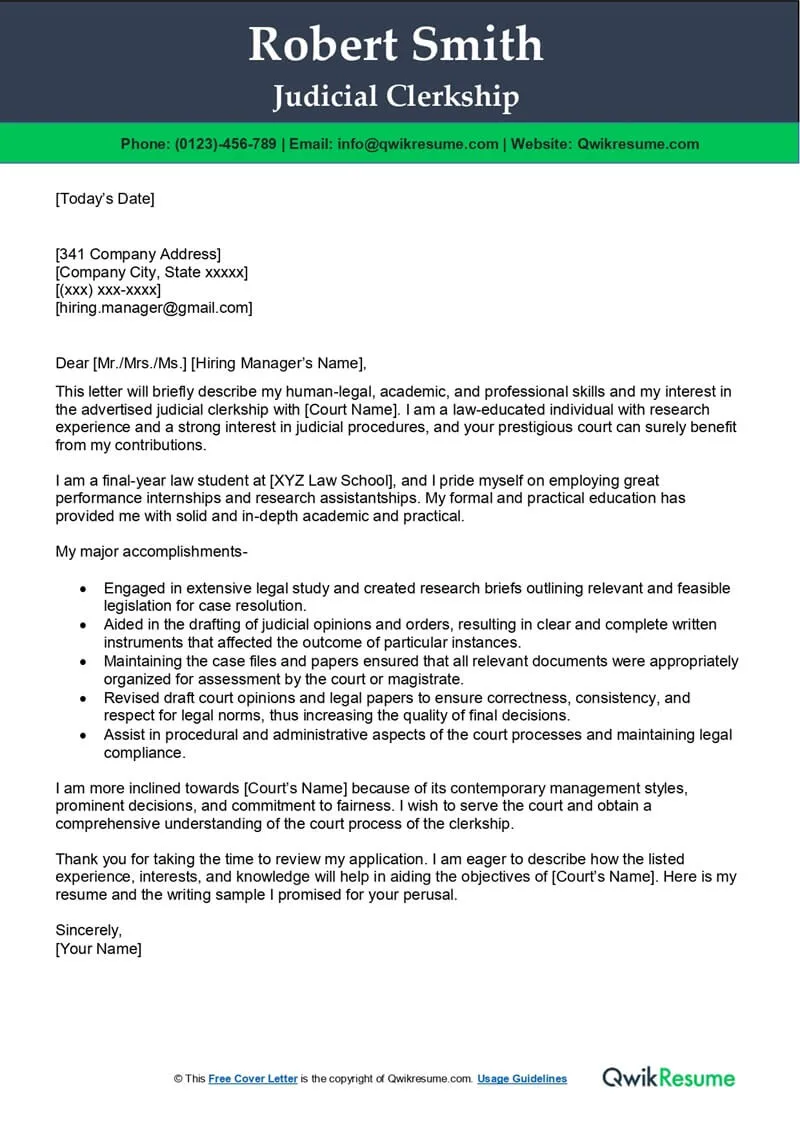
Contact Information and Salutation
Start your cover letter with your contact information. Include your name, address, phone number, and email address. Make sure your email address is professional. Follow this with the date and the judge’s name, title, and court address. The salutation should be formal, such as “Dear Judge [Last Name].” Avoid informal greetings.
Opening Paragraph
The opening paragraph should immediately capture the judge’s attention. State your interest in the judicial clerkship and where you learned about the opportunity. Mention the specific judge or court to which you are applying. Briefly introduce yourself and your qualifications. Make it clear why you are writing and what you are hoping to achieve. Express your enthusiasm and enthusiasm for the opportunity. This section is your hook; it needs to be concise and compelling. Your goal is to make the judge want to read the rest of your letter.
Body Paragraphs Skills & Qualifications
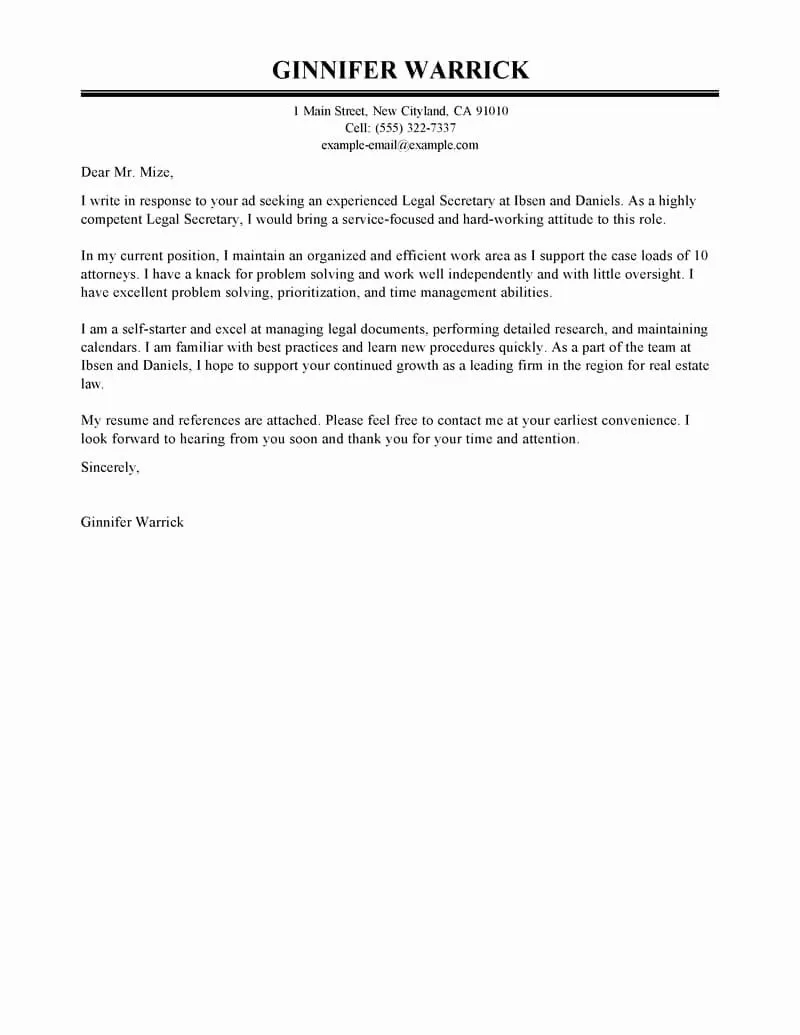
The body paragraphs are where you provide the details. Focus on your skills, qualifications, and experiences. Explain why you are the right fit for the clerkship. Highlight your legal research and writing abilities, academic achievements, and any relevant experience. Use specific examples to demonstrate your skills. Avoid generic statements. Instead of saying you have strong analytical skills, describe how you used those skills in a specific situation. Explain how you tackled complex legal issues. Connect your skills and experiences to the requirements of the clerkship. Show the judge that you understand the role and what it entails. This will help you stand out from the competition.
Closing Paragraph
The closing paragraph should summarize your interest in the position and reiterate your enthusiasm. Thank the judge for their time and consideration. State your availability for an interview and how you can be reached. Provide any additional information that may be relevant. End the letter with a professional closing, such as “Sincerely” or “Respectfully.” Ensure your closing is professional and aligns with the tone of your letter.
Proofreading and Editing
Before you send your cover letter, proofread and edit it carefully. Errors can damage your credibility. Check for grammatical errors, spelling mistakes, and punctuation errors. Read the letter multiple times, and consider having someone else review it as well. A fresh pair of eyes can often catch mistakes you might have missed. Make sure the letter is clear, concise, and easy to read. Ensure that your formatting is consistent and professional. Pay attention to the font, margins, and spacing. A polished and error-free cover letter demonstrates your attention to detail and professionalism.
Additional Tips for a Winning Cover Letter
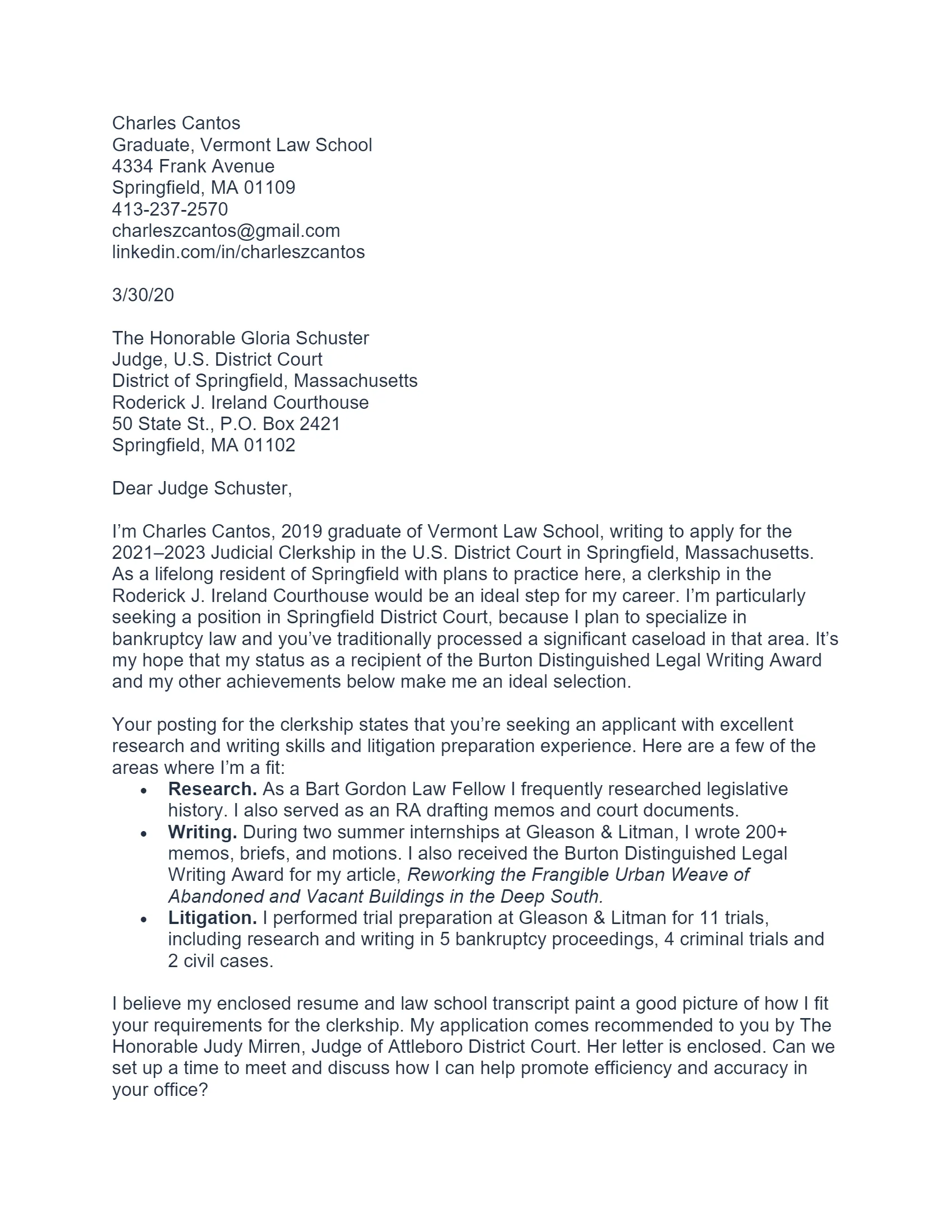
Formatting and Presentation
The format and presentation of your cover letter are as important as the content. Use a professional font, such as Times New Roman or Arial, and a font size of 11 or 12 points. Maintain consistent margins (usually one inch on all sides) and single-space your text. Ensure your letter is well-organized, with clear headings and subheadings. Use a clean and professional layout. Avoid using overly fancy formatting or unusual fonts. Your goal is to present your application in a clear and easy-to-read manner. Also, make sure your cover letter is the appropriate length. A good cover letter is typically one page long. If it’s longer, you might lose your reader’s attention.
Addressing Common Mistakes
Avoid these common mistakes. Do not send a generic cover letter. As discussed, always tailor your letter to the specific judge and court. Avoid clichés and buzzwords, which can make your writing sound impersonal. Do not make any grammatical errors or typos. Proofread your letter carefully. Don’t be overly informal or casual. Always maintain a professional tone. Don’t ramble or include unnecessary information. Keep your letter concise and focused. Avoid any negative statements. Focus on your strengths and what you can bring to the role. Do not exaggerate or misrepresent your qualifications. Be honest and accurate.
Following Up
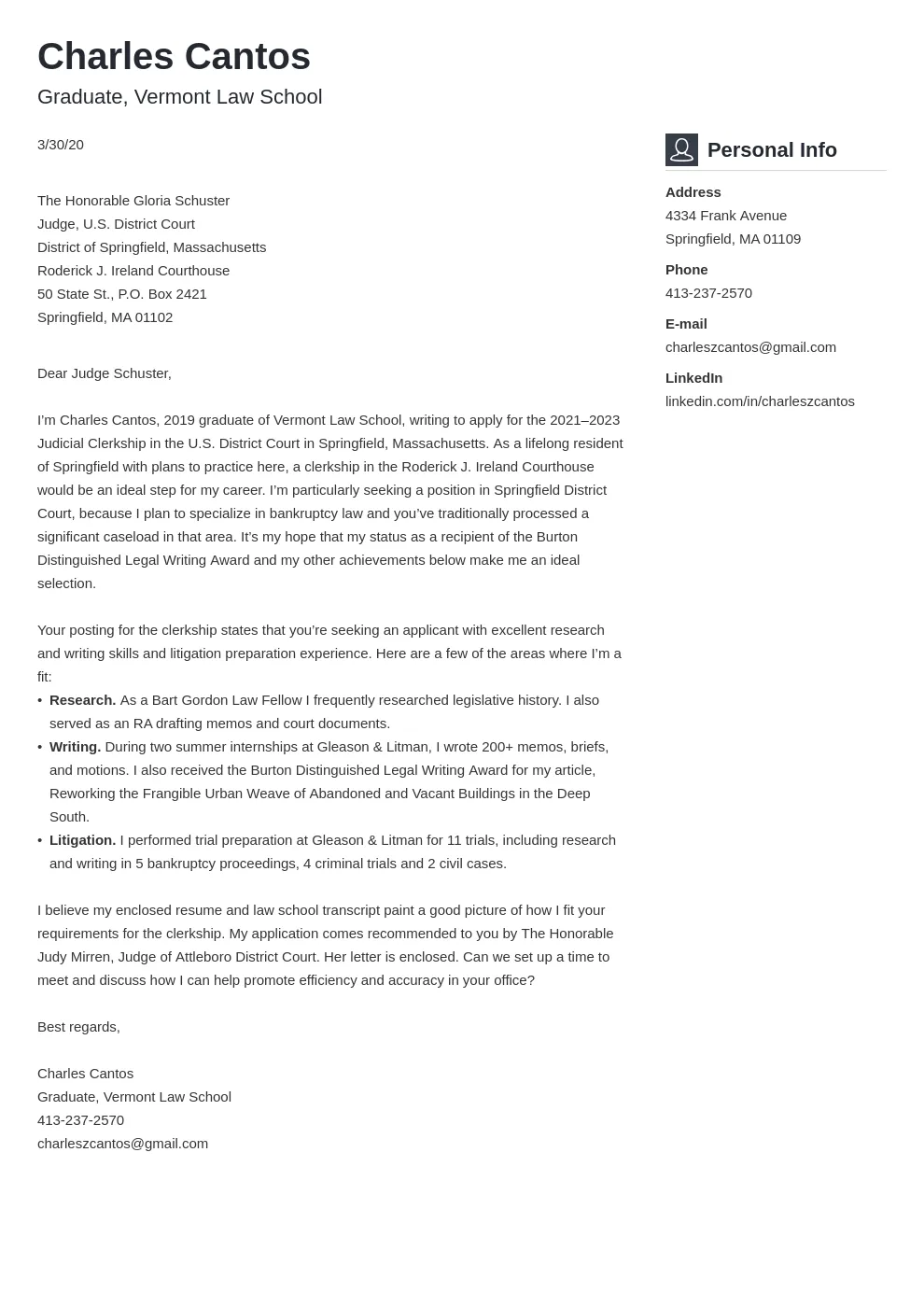
After you’ve submitted your cover letter, it’s appropriate to follow up. Send a thank-you note to the judge or their clerk, especially if you’ve interviewed. If you haven’t heard back within a reasonable timeframe (usually a few weeks), you can send a brief email to inquire about the status of your application. Keep your follow-up concise and professional. Do not be overly persistent or annoying. Thank the judge for their time, reiterate your interest in the clerkship, and simply ask for an update. Following up politely shows your continued interest and professionalism.
